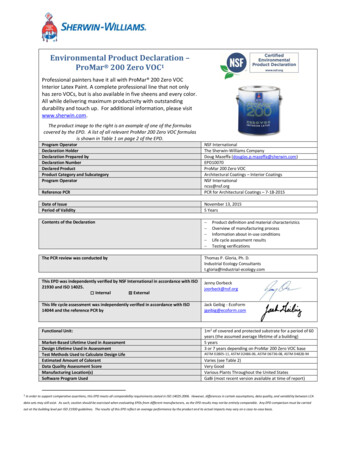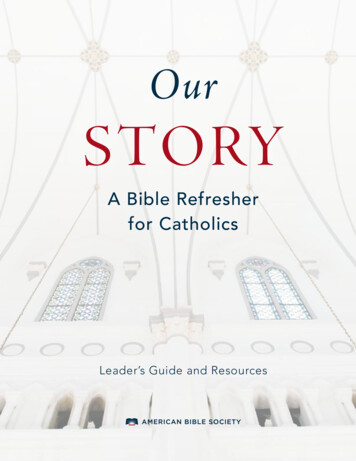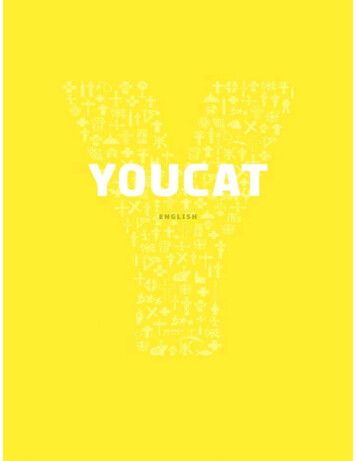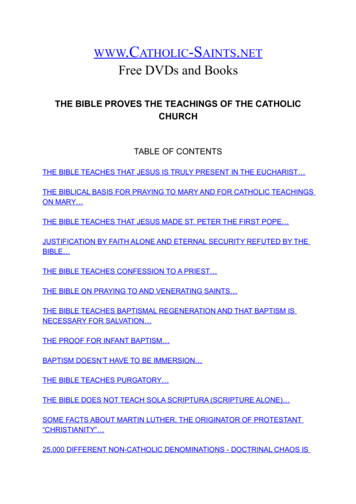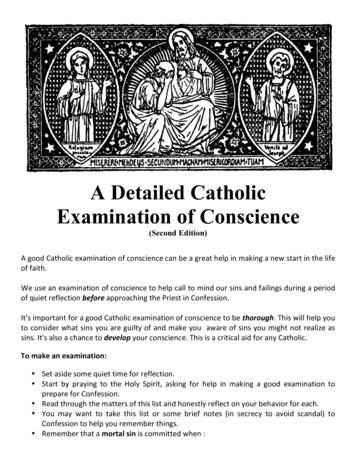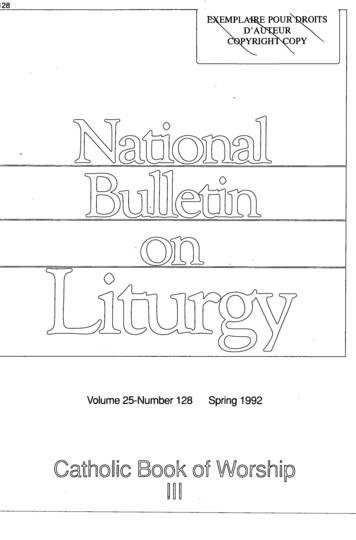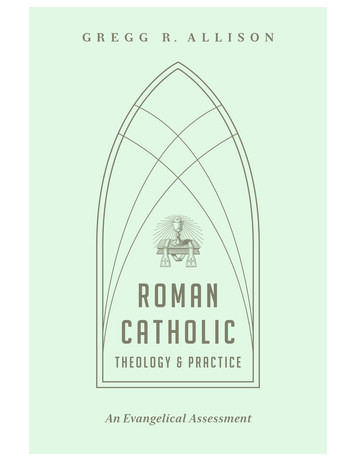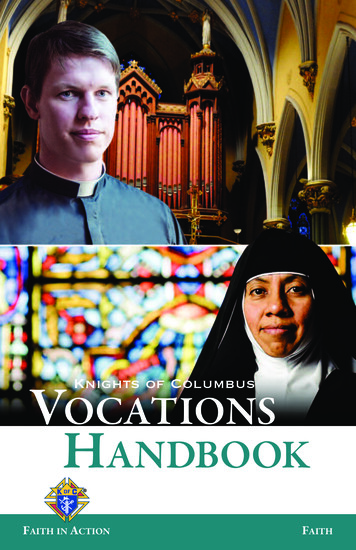
Transcription
Knights of ColumbusVOCATIONSHANDBOOKFAITH IN ACTIONFAITH
VOCATIONSHANDBOOKA Handbook for Vocations Chairmen,Vocations Committees, andAll Brother KnightsPlease do all you can to encouragepriestly and religious vocations
Vocations MessageA vocation is a fruit that ripens in a well cultivated field of mutual lovethat becomes mutual service, in the context of an authentic ecclesial life.No vocation is born of itself or lives for itself. A vocation flows from the heartof God and blossoms in the good soil of faithful people, in the experience offraternal love. Did not Jesus say: “By this all men will know that you are mydisciples, if you have love for one another” (Jn 13:35)?Let us dispose our hearts therefore to being “good soil,” by listening, receivingand living out the word, and thus bearing fruit. The more we unite ourselves toJesus through prayer, sacred Scripture, the Eucharist, the sacraments celebratedand lived in the Church and in fraternity, the more there will grow in us the joyof cooperating with God in the service of the Kingdom of mercy and truth, ofjustice and peace. And the harvest will be plentiful, proportionate to the gracewe have meekly welcomed into our lives.Pope FrancisWorld Day of Prayer for VocationsMay 11, 2014
TABLE OF CONTENTSAbout Vocations . . . . . . . . . . . . . . . . . . . . . . . . . . . . . . . . . . . . . . . . . . . . . . . . . . . . . . 4Priesthood . . . . . . . . . . . . . . . . . . . . . . . . . . . . . . . . . . . . . . . . . . . . . . . . . . . 5Religious Life . . . . . . . . . . . . . . . . . . . . . . . . . . . . . . . . . . . . . . . . . . . . . . . . 6The Knights of Columbus and Vocations . . . . . . . . . . . . . . . . . . . . . . . . . . . . . . 7Objectives: Awareness, Climate, Motivation . . . . . . . . . . . . . . . . . . 7Structure and Meetings . . . . . . . . . . . . . . . . . . . . . . . . . . . . . . . . . . . . . . 8Responsibilities of the State Vocations Chairman . . . . . . . . . . . . . 9Responsibilities of the Council/AssemblyVocations Chairman . . . . . . . . . . . . . . . . . . . . . . . . . . . . . . . . . . . . . . . . 11Programs and Resources . . . . . . . . . . . . . . . . . . . . . . . . . . . . . . . . . . . . . . . . . . . . . . . 12Refund Support Vocations Program (RSVP) . . . . . . . . . . . . . . . . . . 12Refund for Participating in RSVP . . . . . . . . . . . . . . . . . . . . . . . . . . . . 13Vocations Scholarships . . . . . . . . . . . . . . . . . . . . . . . . . . . . . . . . . . . . . . . 14International Support for Seminaries . . . . . . . . . . . . . . . . . . . . . . . . . 15Support for Diocesan VocationsOffices and Programs . . . . . . . . . . . . . . . . . . . . . . . . . . . . . . . . . . . . . . 16Vocations Ads . . . . . . . . . . . . . . . . . . . . . . . . . . . . . . . . . . . . . . . . . . . . . . . 16Vocations Materials . . . . . . . . . . . . . . . . . . . . . . . . . . . . . . . . . . . . . . . . . . 17Vocations DVDs . . . . . . . . . . . . . . . . . . . . . . . . . . . . . . . . . . . . . . . . . . . . 17Holy Hour for Vocations . . . . . . . . . . . . . . . . . . . . . . . . . . . . . . . . . . . . 18Vocations Awareness Days . . . . . . . . . . . . . . . . . . . . . . . . . . . . . . . . . . . 18Poster and Essay Contests . . . . . . . . . . . . . . . . . . . . . . . . . . . . . . . . . . . . 19Other Programs . . . . . . . . . . . . . . . . . . . . . . . . . . . . . . . . . . . . . . . . . . . . . 19Definitions and Clarifications . . . . . . . . . . . . . . . . . . . . . . . . . . . . . . . . . . . . . . . . . 20Policy Statement . . . . . . . . . . . . . . . . . . . . . . . . . . . . . . . . . . . . . . . . . . . . . . . . . . . . . . 24
ABOUT VOCATIONSEvery Catholic has a vocation. In fact, as a member of the Church, everyCatholic participates in the reality of “vocation” in three distinct butrelated senses.First, there is the common Christian vocation that comes in Baptism.This can be expressed in various ways, but in general terms it meansloving and serving God and neighbor and helping to carry on themission of the Church.Vocation also refers to a “state in life” or a way of being Christian –priesthood, religious life, marriage, and so forth. States in life are thespecial, lifelong settings in which people live the baptismal vocation.Finally, there is personal vocation. The personal vocation of each one ofus takes shape in the unique combination of talents, personalcharacteristics, relationships and life circumstances – including both ourcommon Christian vocation and our state in life – that point to thespecial role God wants us to play in his redemptive plan. Membership inthe Knights of Columbus is part of the personal vocation of manyCatholic men.When people speak of “vocation,” they usually mean vocation in thesecond sense – state in life. Most Christians are called by God to themarried state, and some are called to the state of single laypersons livingin the world. But Jesus also chooses certain men to act in his Personthrough the celebration of the Holy Eucharist and the othersacraments; they are called to be priests. Others are called to the clericalstate as permanent deacons. And still others, both women and men, arecalled to what is known as consecrated life – a way of life marked by theevangelical counsels of poverty, chastity, and obedience – whose mostfamiliar expression is religious life.The Knights of Columbus cherishes and celebrates all forms of vocationas gifts of God. But because of the Church’s urgent need for priests andconsecrated religious women and men, the Order’s vocations program4
gives special priority to promoting these vocations. Vocations of allkinds arise and are nurtured within families. This “family” dimension ofvocations makes lay involvement particularly important.Let’s look briefly at the “state in life” vocations of priesthood andreligious life on which the vocations program is focused.PriesthoodJesus called his first disciples at the Sea of Galilee (cf. Mk 1:16-20) andlater said to them: “You did not choose me, but I chose you andappointed you that you should go and bear fruit” (Jn 15:16). Christ, theHead of the Church and Lord of all creation, continues his salvific workin our own time. The ministerial priesthood is a privileged share in hiswork.As the life of Christ was consecrated to the authentic proclamation ofthe loving will of his Father, so too the life of priests should beconsecrated, in the name of Christ, to the same proclamation. The priestis called to assist the bishop in his threefold responsibility of teaching,sanctifying, and ruling. The priest must be a teacher of the Word, aminister of the sacraments, and a pastor of his flock. Pope John Paul IIreminded us: “Without priests the Church would not be able to live thatfundamental obedience which is at the very heart of her existence andher mission” (Apostolic Exhortation Pastores Dabo Vobis, 1).In his 2007 World Day of Prayer for Vocations address, Pope BenedictXVI further taught: “The People of God, organically structured underthe guidance of its Pastors, lives the mystery of communion with Godand with each other, especially when it gathers for the Eucharist. TheEucharist is the source of that ecclesial unity for which Jesus prayed onthe eve of his passion: ‘Father that they also may be one in us, so thatthe world may believe that you have sent me’ (Jn 17:21). This intensecommunion favors the growth of generous vocations at the service ofthe Church: the heart of the believer, filled with divine love, is moved todedicate itself wholly to the cause of the Kingdom.”5
Religious LifeJesus also chooses certain men and women to be signs of his love whileimitating his own way of living by embracing the consecrated life, whosemost familiar expression is the religious life.Consecrated life is a special Christian lifestyle—a special way ofholiness—marked by publicly professing or promising the evangelicalcounsels of poverty, chastity and obedience, and living them as a sign ofthe in-breaking Kingdom of God. Consecrated life has several formsincluding religious institutes, secular institutes, hermits and consecratedvirgins.For most Catholics, the religious institute is the form of consecrated lifethat is most familiar. In addition to the elements common to allconsecrated life, religious life requires that those who have professed theevangelical counsels live the common life, sharing all they possess andengaging in the common apostolic works of their religious community.The Church recognizes many religious institutes, commonly calledreligious orders, congregations or societies. A religious man may be amonk, friar, or brother, and may or may not be ordained as a priest. Areligious woman may be a cloistered nun or an active sister.6
THE KNIGHTS OF COLUMBUS AND VOCATIONSFounded by a parish priest, the Knights of Columbus has always been astrong defender of the priesthood and religious life and a generoussupporter of seminarians and religious in formation. As the largestCatholic fraternal organization in the world, the Order seeks to assistthe Church with financial and moral assistance for this purpose. In lightof the needs of the Church in our day, the Order has intensified itspromotional programs in recent years.As Knights get more involved in vocations efforts, they find newmeaning in their own vocations as Catholic laymen and members of theOrder. They also learn more about the importance of teamwork, for thebest vocations programs are those planned and carried out by a team.The vocations chairman is a leader. His job is to call others together,inspire them to share prayers, ideas and plans, and then reach outbeyond the group. The model is Jesus’ work with the Apostles.Successful groups need not be large, but they must be committed.Just as priestly and religious vocations are vocations within the Churchand at the service of the Church, so the Knights of Columbus vocationsprogram operates within the Church and at her service. Locally,programs should be integrated as much as possible with existingparish and diocesan efforts. For instance, in an ideal situation aKnights of Columbus council will take an active part, or even play aleadership role, in a parish or diocesan vocations program.Objectives: Awareness, Climate, MotivationIn general, a vocations program will have three objectives: awareness,“climate,” and motivation.7
1. Awareness: The aim is to explain the meaning of different vocations,underline the Church’s urgent need, and encourage people – youngpeople in particular – to hear what God is asking of them.2. Climate: This means being aware – and working to make othersaware – of the social, cultural, and religious spirit of the times andhow it impacts – for good and for ill – people’s readiness to heed andanswer God’s call.3. Motivation: The intent is to move people to respond positively toGod’s call by entering seminaries and novitiates, if this is what God isasking of them, and to persevere in the program of formation for thepriesthood or religious life after having done so.Structure and MeetingsThe chairman of either a state or local vocations committee shouldconvene committee meetings at least four times a year. The chaplainshould be present if possible. Meetings should follow a standardKnights of Columbus committee meeting format. While dates andtimes are up to the chairman and his committee members, it isimportant to schedule meetings so that work can begin early in thefraternal year.Topics for meetings include at least the following:State Meetings1. Proper and complete implementation of the Refund SupportVocations Program (RSVP) (see p.13);2. Possible financial aid to seminarians within the state’s jurisdiction;3. Possible aid to overseas seminarians or seminaries;4. Organized prayer to promote vocations;5. The annual observance of Vocations Awareness Week;8
6. Promoting Knights of Columbus vocational efforts through themedia; and7. Establishing and maintaining a good working relationship with localbishops.Local Meetings1. Proper and complete implementation of RSVP;2. Vocations awareness days at Catholic elementary, secondary schoolsor colleges;3. Sponsorship of poster or essay contests in Catholic elementary andsecondary schools;4. Organized prayer to promote vocations, especially Holy Hours;5. Effective distribution of Knights of Columbus and CatholicInformation Service vocations materials in parishes, Catholic schools,and retreat houses;6. Promoting Knights of Columbus vocations efforts through localmedia;7. Effective publicity to encourage attendance at vocations events; and8. Establishing and maintaining a good working relationship with thelocal pastor and other priests.In the case of both state and local meetings, keeping accurate minuteswill be of great help to future chairmen and committee members.Responsibilities of the State Vocations ChairmanThe primary responsibility of the state vocations chairman is to ensurethe proper and complete implementation of RSVP. He should contactthe vocations director or directors of the diocese or dioceses in hisjurisdiction and develop a good working relationship. (To find out whothey are, and their addresses and phone numbers, consult The Official9
Catholic Directory, also sometimes called the “Kenedy Directory.” Mostparishes have a copy.) In particular, the chairman should make surethat every diocesan seminarian and religious novice in hisjurisdiction is included in RSVP.Beyond that fundamental responsibility, the state chairman may alsocontact the vocations directors of religious communities, the rectors ofseminaries, and directors of houses of formation within his jurisdiction.(Again, consult The Official Catholic Directory.) Once RSVP is properlyorganized and functioning, the state chairman, in cooperation with thevocations committee and the state officers, should look into thepossibility of helping dioceses or religious institutes with other programsto promote priestly and religious vocations.The state vocations chairman is responsible for conducting thecommittee meetings required to develop and carry out state-levelvocations efforts. He should motivate his fellow officers, especiallyconcerning implementation of RSVP. In this regard, the state deputymay choose to call upon his district deputies to assist the vocationschairman.State vocations chairmen will find it helpful to read the apostolicexhortation of Pope John Paul II called I Will Give You Shepherds(Pastores Dabo Vobis). In this document, published in 1992 andavailable at most Catholic bookstores or online, the Holy Father speaksof the significance of the priestly vocation and of how lay people canassist in promoting and supporting vocations to the priesthood.Additionally, each year the Holy Father issues a message on the WorldDay of Prayer for Vocations (late February/early March). This messagecan help to situate the work of the vocations chairmen in the HolyFather’s larger vision for vocations in the universal Church.10
Responsibilities of the Council/Assembly Vocations ChairmanThe primary responsibility of the council or assembly vocationschairman is to ensure the proper and complete implementation of theRSVP program at the local level. He should work with the statevocations chairman to ensure that every seminarian sponsored by thediocese or dioceses, and every religious novice in his jurisdiction isincluded in RSVP.When it is certain that every diocesan seminarian and religious novice iscovered, the local chairman may also contact the vocations directors ofreligious orders or the rectors and directors of seminaries and houses offormation within his jurisdiction. (The Official Catholic Directory willtell you who they are; see above.) Once the RSVP program is properlyorganized and operating, the council or assembly vocations chairman, incooperation with the vocations committee and the local officers, shouldlook into ways of assisting parishes, seminaries, houses of formation,monasteries, and/or other religious institutes with programs to promotepriestly and religious vocations.The chairman is responsible for conducting the committee meetingsneeded to develop and carry out his council’s or assembly’s vocationsefforts. He must motivate his brother Knights to promote priestly andreligious vocations, with particular emphasis on RSVP. In this regard,the chairman may seek the help of his district deputy. Upon completinghis term, he should share what he has learned with the incomingvocations chairman. Like state chairmen, local chairmen will alsobenefit from reading Pope John Paul’s I Will Give You Shepherds, aswell as the yearly papal Day of Prayer for Vocations messages (see above).11
PROGRAMS AND RESOURCESRefund Support Vocations Program (RSVP)The Knights of Columbus has long supported vocations to thepriesthood and religious life, particularly through the Refund SupportVocations Program (RSVP). Through this program, your council“adopts” one or more seminarians or postulants, providing them withfinancial assistance and moral support. It’s a way for your council toinvest in the future of our Church.To have your council participate in RSVP, your committee chairmanshould: Review RSVP guidelines and eligibility requirements. Locate one or more candidates to support. If you need help, contactyour pastor or diocesan vocations director. After a candidate’s name and address is secured, set up a councilplanning meeting to determine:- The amount of money to be raised.- How the relationship will be managed.- The presentation of the check. When presenting money to an RSVP candidate, notify the diocesanvocations director. Take photos and send them to your local and diocesan newspapers,and Columbia magazine. Be sure that caption information is completeand each individual’s name is spelled correctly. RSVP assistance also involves prayer and moral support:- Make at least one personal visit to each sponsored seminarian orpostulant.- Encourage members and their families to keep the seminarian orpostulant in their prayers.12
- Send communications throughout the year – e.g., birthday,Christmas and Easter greetings.- Invite them to all council activities.- Include them in mailing of newsletter or other communications.- Invite them to make a presentation to the council, parish, and/orparish youth group on what it means to prepare for priesthood orreligious life.- Arrange for them to host a group of young people from the councilor parish at their seminary to meet other seminarians.- Make sure to offer congratulations and support to your seminarianor postulant on their ordination.Refund for participating in RSVPCouncils involved in RSVP may qualify for a refund from the SupremeCouncil headquarters. For every 500 donated, a council or assemblymay receive 100 (for a maximum refund of 400 per individual).Councils and assemblies in the Philippines and Mexico receive theequivalent in local currency of 50 for every 250 donated.Use the following guidelines to help ensure eligibility for the rebate.1. Persons eligible to receive RSVP funds include: Seminarians who have been accepted by a diocese and are currentlyin their “spirituality” year. Seminarians attending major seminaries in preparation for priestlyordination. Seminarians in their “pastoral” year. Seminarians attending minor seminaries. Seminarians who belong to a religious institute and are currently information for the priesthood.13
Men and women who are postulants or novices in religious ordersor religious communities.2. Persons NOT eligible for RSVP funds include: Priests or religious seeking assistance for continuing education. Religious brothers not studying for the priesthood. Candidates for the permanent diaconate.3. Funds donated to each individual must be vocation-related andamount to at least 500 per individual.4. The funds must be given directly to an individual and NOT to aninstitution or fund.5. The funds must be paid with a check[s] drawn on the council’saccount.To receive the rebate, your council will need to:1. Complete and submit the RSVP Refund and Plaque Report Form(#2863). This form needs to be accompanied by all supportingdocumentation, which includes canceled checks and evidence ofmoral support provided to the seminarian or postulant.2. For the most up-to-date information pertaining to the eligibility forthe rebate and program requirements for RSVP, please visitkofc.org/rsvp.Father Michael J. McGivney Vocations ScholarshipsBishop Thomas V. Daily Vocations ScholarshipsTwo vocations scholarship programs, Father Michael J. McGivneyVocations Scholarships (based on need) and Bishop Thomas V. DailyVocations Scholarships (based on merit and academic excellence),provide scholarships to seminarians during their first four years oftheological studies. Each grant of 2,500 for tuition, room and board isrenewable up to a maximum of four years upon evidence of continuedenrollment and eligibility. The scholarship is not in effect during anyyear of pastoral internship.14
An applicant who has appropriate ecclesiastical approval, who has beenaccepted at a major seminary, and who is studying for a diocese orreligious institute in the United States, its territories, or Canada iseligible. Preference is given (but is not limited) to applicants who aremembers of the Knights of Columbus or whose fathers are members.For a Father Michael J. McGivney Vocations Scholarship, an applicantmust provide information to establish financial need.For a Bishop Thomas V. Daily Vocations Scholarship, an applicantmust include a copy of his most recent transcript and two letters ofrecommendation.Scholarship applications are mailed to rectors of major seminaries anddiocesan vocations directors in January. The completed applicationmust be received at the Knights of Columbus by June 1 to beconsidered for a scholarship. Send completed applications to:Department of ScholarshipsKnights of Columbus Supreme Council1 Columbus PlazaNew Haven, CT 06510-3326International Support for SeminariesIn addition to providing scholarships to seminarians, the Knights ofColumbus Supreme Council has established several funds for variouspontifical colleges in Rome (North American College, PontificalCanadian College, Pontifical Mexican College) and Belgium (AmericanCollege, Louvain). The annual earnings from these funds are disbursedto the seminaries for their general use. Special funds for advancedstudies for priests from the Philippines and Puerto Rico also provideearnings annually.Many state councils give generous support to seminaries in theirjurisdictions. With the cost of room, board, and tuition for a seminarian15
now many thousands of dollars annually, bishops warmly appreciate thishelp, and the Supreme Council strongly encourages it. The state deputyor vocations chairman, or both, should meet with seminary rectors todiscuss ways of being of assistance.Support for Diocesan Vocations Offices and ProgramsEvery diocese has a vocations office to promote vocations awareness andrecruit candidates for the priesthood and religious life. Bishopsappreciate monetary and other assistance to these offices. At thenational level, the Supreme Council has contributed to the secretariatfor vocations and priestly formation of the United States Conference ofCatholic Bishops to help support the U.S. bishops’ national vocationspromotion program. State and local vocations chairmen are encouragedto meet with directors of vocations offices in their dioceses to see howthey can help.Vocations AdsThe Order’s magazine Columbia each month carries an advertisementon its back cover promoting priestly and religious vocations. These adshave generated great favorable response. Reading about a man orwoman who has responded to the Lord’s call can inspire someone elseto do the same. The ads also help spread vocations awareness amongKnights of Columbus members and others.State or local councils and assemblies are welcome to copy Columbiaand ads for nonprofit use in parish bulletins and flyers. For permissionto reproduce an ad or ads in a professional advertising campaign(newspapers, billboards, etc.), contact:DirectorCatholic Information ServiceKnights of Columbus Supreme Council1 Columbus PlazaNew Haven, CT 06510-332616
If there is a seminarian or member of a religious institute that youwould like to recommend for inclusion in one of these advertisements,write to the Director, as above.Vocations MaterialsThe Knights of Columbus offers attractive vocations posters suitable foruse in schools, churches, retreat houses, and other places. One poster isdirected to young people, with the theme of “Keep the Faith Alive”(#2959).In addition, the Supreme Council office makes available vocationsprayer cards, bookmarks, and booklets on several topics. All vocationsmaterials can be found in Supplies Online, the supply ordering systemfound in Officers Online.Vocations DVDsFive award-winning video productions are available to councils on oneDVD – all ideal for use in councils, parishes or Catholic schools topromote vocations in the Church: The Vocation to the PriesthoodHighlighting the lives of priests who have experienced the widerange of events that are part of the ministry, this film is ideal forviewing by those contemplating a call to the priesthood. The Vocation to MarriageIn a warm and anecdotal format, this film presents the teaching ofthe Church regarding Christian marriage and family. It is ideal forcouples preparing for marriage. The Vocation to Religious Life for WomenThis film promotes religious life for women in a contemporary andattractive medium. It is an important and effective tool for womencontemplating a call to religious life.17
The Vocation to Religious Life for MenThis film promotes stories from men who are called to followChrist as religious brothers, offering their lives in service to thechurch and its people. The Vocation to the LaityThis film shows how charity, the first principle of the Order, servesas a basis for the Lay vocation.Holy Hour for VocationsMany state and local councils sponsor Holy Hours to pray forvocations. Their format can vary from parish to parish, but they usuallyinclude adoration of the Blessed Sacrament, recitation of the Rosary,Scripture readings, and other prayers.Vocations chairmen are encouraged to contact pastors to see if theywould like to conduct Holy Hours in their parishes. The vocationscommittee should cooperate as requested in helping to organize theevent. In particular, the committee can generate publicity to stimulateattendance.If it is not feasible to have a Holy Hour in a parish, perhaps Mass couldbe celebrated monthly for the intention of more priestly and religiousvocations.Vocations Awareness DaysAn excellent way to heighten vocations awareness is by sponsoringVocations Awareness Days at Catholic elementary and secondaryschools, and colleges. Some state and local councils have hadtremendous success with these events.Usually they feature visual displays for students in an auditorium, gymor student union, with people from the diocesan vocations office andreligious institutes on hand to answer questions. The event can be anall-day affair or can be held during hours of free time. Refreshments18
offered in a congenial setting can help attract students, especiallycollegians. Publicity is essential.State and local vocations chairmen are encouraged to contact schoolofficials about holding such events. Diocesan and religious institutevocations directors should be invited to participate, and the local bishopshould be informed.Poster and Essay ContestsSome councils have successfully sponsored essay and/or poster contestsfor students in Catholic elementary and secondary schools. Contestantsprepare an original essay or original poster encouraging awareness ofpriestly and religious vocations. In doing so, their own vocationsawareness increases. The judging should be carried out and the prizesawarded according to criteria established by the council or assembly.Other ProgramsMany state and local councils and individual Knights work forvocations in other unofficial ways. For instance, some members of theOrder take a young priest out to dinner every month in order to givehim fraternal support. Others pay for vocation-related publicadvertising such as billboards.Councils and assemblies should be creative and take the initiative inpromoting vocations. The use of media can be very helpful in this area.Naturally, whatever is done in the name of the Order must observeecclesiastical norms and the policies of the Knights of Columbus.19
DEFINITIONS AND CLARIFICATIONSIn working for vocations, you may find yourself using certain unfamiliarterms. Here is a quick rundown.Diocesan seminarian. A diocesan seminarian is a man who has beenaccepted by a diocese to study for the priesthood. The studies usuallyinclude four years in college seminary (unless the candidate has alreadygraduated from college, in which case he will enter the pre-Theologyprogram), a “spirituality” year of spiritual formation, at least four yearsof study in a major seminary (also called a theologate), and a year ofpastoral internship (parochial or other field work) prior to ordination.Anywhere from six months to 18 months before priestly ordination, theseminarian is ordained a deacon, and is then called “Rev. Mr.”Seminarians’ garb differs from diocese to diocese. Some wear secularclothing until the diaconate, while others wear clerical suits and cassocksfrom the start. All eligible diocesan seminarians can participate in allKnights of Columbus vocations programs.Candidate. This term refers to a man or woman who has been formallyaccepted for admission into a seminary or novitiate program. Acandidate may receive RSVP funds whether he is in college seminary, apre-theology, or a major seminary.College seminarian. A college seminarian (sometimes called “minorsemina
Catholic participates in the reality of “vocation” in three distinct but related senses. First, there is the common Christian vocation that comes in Baptism. This can be expressed in various ways, but in general terms it means loving

